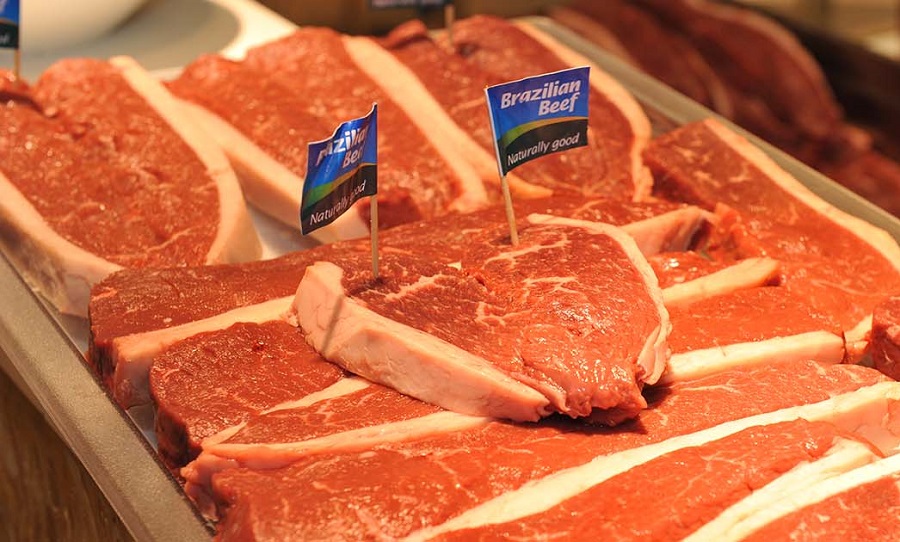RIO DE JANEIRO, BRAZIL – In telegrams to the Ministry of Foreign Affairs, the Brazilian embassies in China and Russia have reported issues involving the country’s exported foods. According to diplomats, authorities in both countries are demanding solutions and there are complaints about “lack of control” in relation to Brazilian products.
Moscow, for example, alerted to the rate of pesticides above the permitted limit. In 2020 alone, the complaint involved more than 300,000 tons of soy.

In turn, the mission in Beijing reported at least six records of the presence of the novel coronavirus in meat and fish packages.
In the telegrams, the two embassies said that the inspection bodies in Russia and China urged the Ministry of Agriculture, Livestock and Supply (MAPA) to take action.
According to data from Comex Stat, a government system for consultation and extraction of Brazilian foreign trade data, soybeans corresponded to 25% of Brazilian exports to Russia in 2020.
In one of the January telegrams, the Brazilian embassy to Moscow reported that the Russian Federal Service for Veterinary and Phytosanitary Surveillance is concerned about repeated cases of glyphosate detection above the tolerated level. The document pointed out that Russia is tightening control over the presence of the substance in grain products, in the domestic market and in export and import operations.
The justification used by the country was the high degree of glyphosate toxicity for humans and animals, confirmed by World Health Organization studies.
In Brazil, this type of agrotoxin is allowed by the Brazilian Health Regulatory Agency (ANVISA).
The cable signed by the ambassador to Russia, Tovar da Silva Nunes, reported that the Russian regulatory agency has repeatedly informed MAPA about the supply to the country of soybeans with levels above those allowed since 2019.
“The Russian side has brought to the attention of Brazilian colleagues the need to take corrective measures as soon as possible,” the diplomat wrote. Nunes added that disregard of pesticide limits are a violation of the requirements of the Customs Union’s technical regulation on grain safety.
According to the telegram, the results of safety checks on grains imported by Russia found, in part of the soybeans exported last year, glyphosate content up to 14.2 times higher than the maximum of 0.15 mg/kg provided for in the requirements of the customs union’s technical regulation.
“Which points to the lack of adequate state control by the competent authorities in Brazil. In this respect, Rosselkhoznadzor [the Russian regulator] said in a statement that it reserves the right to impose a temporary ban on the import of the products in question from Brazil,” Nunes wrote.
Telegrams from the embassy in Beijing reported the detection of coronavirus in products exported to the Asian country last year. In one of the correspondences, from November, ambassador Paulo Estivallet de Mesquita reported that the Chinese customs suspended a Brazilian fish exporting establishment.
The measure was taken due to the failure to present corrective measures after the products tested positive for the virus causing Covid-19.
“In the communication, Chinese Customs states that it expects MAPA to attach importance to the identification of the novel coronavirus in products exported by Brazil to China and to the non-conformities found in the audit by videoconference,” Mesquita wrote.
According to him, the agency “requests that the Brazilian authorities implement measures to investigate the cause of contamination, request the adoption of corrective measures by the establishment, and notify these corrections to the Chinese side, in order to ensure the safety of fish exported to this market.”
Also in November, Mesquita advised that the Chinese press intensified news that associated the emergence of new cases of Covid-19 in the country’s ports and airports with contact with imported products.
Speaking specifically about Brazil, he mentioned at least five instances in which the media dealt with the detection of the coronavirus in imported products from the cold chain. The cases occurred in Hubei, Shanxi and Shandong provinces.
“The Chinese media continue to insist on the narrative that imported frozen foods present a high risk of Covid-19 transmission, insinuating that the first case of the epidemic, in Wuhan, would have originated from products coming from other countries,” the ambassador wrote.
MAPA said in a statement that similar issues are routinely dealt with in the commercial relationship between countries.
“The two points mentioned have been analyzed and are continuously monitored between Brazil and the governments of China and Russia. The commercial flow of these countries with Brazil remains fluid, without interruption,” it said.
“Both protect the health of employees and preserve the safety of food produced for the domestic and international markets.”
The entity also said that technical-scientific organizations related to human health and food production have conducted research that found that the risk of Covid-19 transmission through packaging is virtually zero.
Source: Valor

